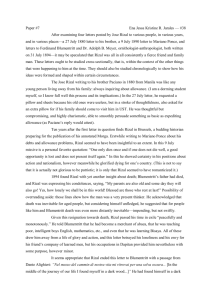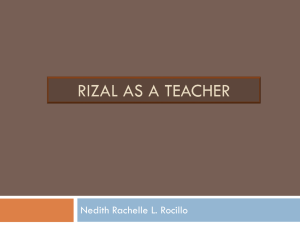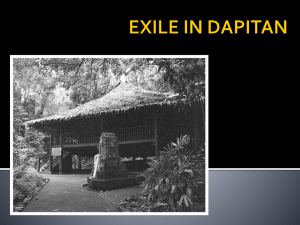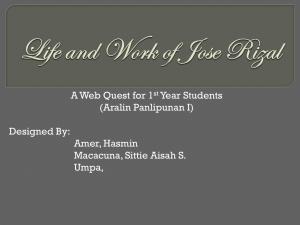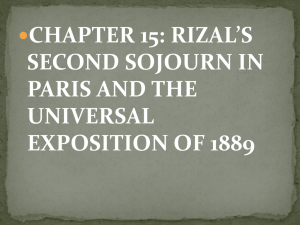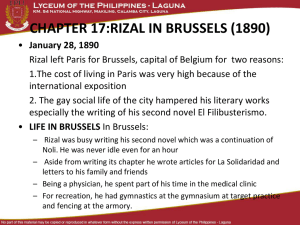a copy of the speech - SyCip, Salazar, Hernandez
advertisement
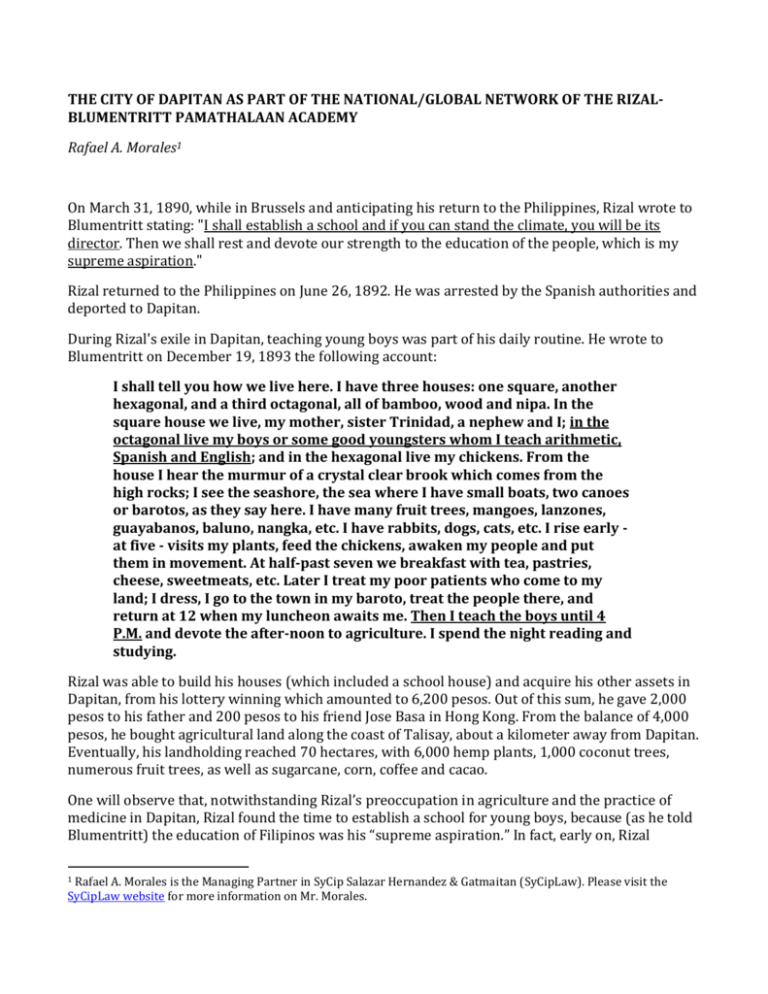
THE CITY OF DAPITAN AS PART OF THE NATIONAL/GLOBAL NETWORK OF THE RIZALBLUMENTRITT PAMATHALAAN ACADEMY Rafael A. Morales1 On March 31, 1890, while in Brussels and anticipating his return to the Philippines, Rizal wrote to Blumentritt stating: "I shall establish a school and if you can stand the climate, you will be its director. Then we shall rest and devote our strength to the education of the people, which is my supreme aspiration." Rizal returned to the Philippines on June 26, 1892. He was arrested by the Spanish authorities and deported to Dapitan. During Rizal's exile in Dapitan, teaching young boys was part of his daily routine. He wrote to Blumentritt on December 19, 1893 the following account: I shall tell you how we live here. I have three houses: one square, another hexagonal, and a third octagonal, all of bamboo, wood and nipa. In the square house we live, my mother, sister Trinidad, a nephew and I; in the octagonal live my boys or some good youngsters whom I teach arithmetic, Spanish and English; and in the hexagonal live my chickens. From the house I hear the murmur of a crystal clear brook which comes from the high rocks; I see the seashore, the sea where I have small boats, two canoes or barotos, as they say here. I have many fruit trees, mangoes, lanzones, guayabanos, baluno, nangka, etc. I have rabbits, dogs, cats, etc. I rise early at five - visits my plants, feed the chickens, awaken my people and put them in movement. At half-past seven we breakfast with tea, pastries, cheese, sweetmeats, etc. Later I treat my poor patients who come to my land; I dress, I go to the town in my baroto, treat the people there, and return at 12 when my luncheon awaits me. Then I teach the boys until 4 P.M. and devote the after-noon to agriculture. I spend the night reading and studying. Rizal was able to build his houses (which included a school house) and acquire his other assets in Dapitan, from his lottery winning which amounted to 6,200 pesos. Out of this sum, he gave 2,000 pesos to his father and 200 pesos to his friend Jose Basa in Hong Kong. From the balance of 4,000 pesos, he bought agricultural land along the coast of Talisay, about a kilometer away from Dapitan. Eventually, his landholding reached 70 hectares, with 6,000 hemp plants, 1,000 coconut trees, numerous fruit trees, as well as sugarcane, corn, coffee and cacao. One will observe that, notwithstanding Rizal’s preoccupation in agriculture and the practice of medicine in Dapitan, Rizal found the time to establish a school for young boys, because (as he told Blumentritt) the education of Filipinos was his “supreme aspiration.” In fact, early on, Rizal Rafael A. Morales is the Managing Partner in SyCip Salazar Hernandez & Gatmaitan (SyCipLaw). Please visit the SyCipLaw website for more information on Mr. Morales. 1 2 already had a clear idea of what his school would be. In a paper entitled “Colegio Moderno,” Rizal described the subjects or courses that would be taught in his ideal school, foremost of which were morals and religion. In this regard, a publication summarized Rizal’s moral principles and teachings as follows: Rizal was not a writer of moral treatises; neither was he a moral philosopher, but he had the creative ability to guide society and the people in matters of right conduct. To him morality was the ‘application of reason and conscience to specific problems of behavior.’ It was rooted in religion. References to morality and behavior are constantly expressed in his writings and correspondence. In his expose of the moral evils in 19th century Philippine society, he repeatedly condemned fraud and deceit, the disregard for and abuse of the dignity of the human personality, and mercenary ploy. The virtues he admired were love, forgiveness, integrity, honesty, courage, generosity, purity, justice, honor, purpose, truthfulness, faithfulness to one’s word, compassion, self-control, temperance, and tolerance. . . . A moral man, Rizal believed, is one who possesses these virtues. He lives a good life and perform good deeds. He is capable of doing good because God fashioned him to His image and endowed him with the gift of reason and intelligence.* Rizal failed to see the implementation of his aspired-for educational institution during his lifetime, but he had hoped that his countrymen would fulfill this particular dream of his. The Rizal-Blumentritt Pamathalaan Academy is a step in this direction. It seeks to imbue education, governance, development and diplomacy with the moral and sacred ideals for which Rizal aspired and to which Blumentritt subscribed. This objective is encapsulized by the term “Pamathalaan” which roughly means “Leadership and Citizenship by the Grace of God.” The name of the Academy includes Blumentritt to take into account the desire of Rizal to make his friend a part of his school. Undoubtedly, Rizal wanted Blumentritt to be involved in Philippine affairs. As early as January 1889 (before he broached the idea of Blumentritt’s becoming a school director), Rizal asked Blumentritt to accept the presidency of the Association Internationale des Philippinistes, which was to study the Philippines from a historical and scientific perspective. To achieve this goal, Rizal suggested that the two of them should convene an international congress where scholars interested in the Philippines were to meet and discuss papers on the subject. The Rizal-Blumentritt Pamathalaan Academy is structured along this concept of Rizal. It is not an academic-degree giving body (like a college or university) but essentially a forum for discussion. Indeed, the “Articles of Incorporation of the Katipunan for the Establishment of the RizalBlumentritt Pamathalaan Academy, Inc.” envisions the Academy: See Chapter 8, “Rizal’s Concept of Nation Building,” in Rizal and the Development of National Consciousness (Second edition: 2006) by Ma. Corona S. Romero, Julita R. Sta. Maria and Lourdes Y. Santos. Chapter 8 was based on “Rizal as a Moral Leader” by Ricardo Pascual, Pilar Hidalgo Lim and Eugene Hassel. * 3 1. To show the national and global impact on education, governance, development, and diplomacy of the moral and sacred ideals shared by the Philippine National Hero Dr. Jose Rizal and the Czech Republic Patriot Dr. Ferdinand Blumentritt; 2. To provide leaders and citizens, as well as classrooms and communities, the transforming and unifying experience of those ideals through “Pamathalaan” or “Leadership by Grace and Citizenship by Grace,” based or anchored on the University of the Philippines’ researches, publications, trainings, special events, and extension services; 3. To consolidate the gains made by the University of the Philippines with other public and private sectors concerning “The Institutionalization of the National Global Rizal-Blumentritt Pamathalaan Academy in the Aquino Administration;” 4. To build the Leaders and Citizens Covenant Monument of RizalBlumentritt Pamathalaan for the World; and 5. To produce short and long versions of a film on Rizal-Blumentritt Pamathalaan of the World. The Articles of Incorporation was approved by the Securities and Exchange Commission on July 8, 2013, a Monday. It is reasonable to believe that the Articles of Incorporation would have been approved on July 7, 2013 (the anniversary of the founding of the Katipunan by Andres Bonifacio), were it not for the fact that July 7th was a Sunday. At any rate, the word “Katipunan” is part of the name of our corporation, since the Academy is an inclusive organization that recognizes as well the contribution of Bonifacio and our other heroes to nation-building based on the moral values espoused by Rizal. It will be recalled that Rizal was associated with the Katipunan as its honorary president. In fact, the name “Rizal” was one of the passwords used by the Katipuneros. On October 10, 2013, we unveiled at the University of the Philippines the “2013 Pilgrimage Covenant Marker of the Rizal-Blumentritt Pamathalaan Academy,” to celebrate the anniversary of the Department of Interior and Local Government whose First Secretary is the Father of the Philippine Revolution Supremo Andres Bonifacio. The marker reads as follows: To fulfill the dream of the Philippine National Hero Dr. Jose Rizal to have an Academy headed by the Czech Republic Patriot Dr. Ferdinand Blumentritt. To fulfill the vision of Rizal and Blumentritt for an international order based on moral sacred foundations. To celebrate the 2013 grace of the moral sacred Philippines for the world. To commemorate the centennial of the September 20, 1913 death of Dr. Ferdinand Blumentritt. 4 To honor and nurture the 1914 National Assembly publication of Vida y Obras de Ferdinand Blumentritt. To honor and nurture the November 30, 1938 University of the Philippines Pilgrimage Marker in Barasoain Church for the significance of the Malolos Congress in Barasoain Church. To realize the April 1895 Holy Week Pilgrimage Covenant of Katipunan in Pamitinan Cave of Rodriguez, Rizal, for freedom with honor and holiness. To give birth to leaders, citizens, and communities embodying Pamathalaan as Leadership by Grace, Citizenship by Grace. Done by the Katipunan for the Establishment of the Rizal-Blumentritt Pamathalaan Academy, Inc. Launched in Litomerice (Czech Republic), Vatican City, and Abu-Dhabi (United Arab Emirates) on July 30 - August 13, 2013. I would like to close by recalling to mind the words of Father Florentino in El Felibusterismo, after he flung to the sea the steel case containing Simoun’s fabled fortune. Father Florentino said: May nature keep you in its deep abyss, with the coral and pearls of its eternal seas. When men need you for a holy, sublime reason, God will pull you from the bosom of your waves. And meanwhile, where you are now you will do no harm, you won’t twist what is right, nor be the cause of any avarice. I would like to believe that Simoun’s fortune thrown to the sea by Father Florentino represents the still-untapped wealth of our country that will fuel the all-inclusive national progress for which we have long aspired but which has been eluding us. However, based on the prophetic words of Rizal (spoken through Father Florentino), we can tap that wealth and achieve that elusive aspiration but only with moral redemption. The Rizal-Blumentritt Pamathalaan Academy is here to be of assistance in this redemptive endeavor. August 6, 2014, Dapitan City.
